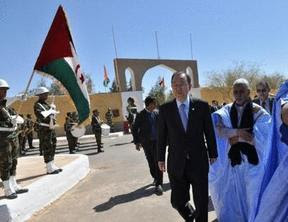United Nations
(United States)
(AFP)

The Security Council called for the UN mission in Western Sahara to resume working at “full capacity,” in its first statement following a dispute between Secretary General Ban Ki-moon and Morocco.
The United Nations said Tuesday it closed its military liaison office in Dakhla, Western Sahara at the request of Morocco, which was angered when Ban referred to the “occupation” of the disputed territory.
The 15 Security Council member states, while refraining from taking sides in the dispute, stressed “the importance of addressing in a constructive, comprehensive and cooperative manner the circumstances that led to the current situation so that MINURSO may resume its full capacity to carry out its mandate.”
Angolan Ambassador Ismael Gaspar Martins, who is serving as Security Council president for the month of March, relayed the statement to the press after three hours of closed-door consultations.
Ban made the “occupation” remark early this month during a visit to a Sahrawi refugee camp in Algeria.
Morocco on Sunday expelled most of the civilian experts attached to the UN mission and have also closed the military liaison office.
According to the UN, the retaliatory measures are of grave risk to the mission, which has about 500 civilian and military personnel and was established in 1991.
Ban’s comments crossed a red line for Morocco, which considers the former Spanish territory, which it annexed in 1975, as an integral part of the country, proposing self-government for the region under Moroccan sovereignty.
Gaspar Martins said Security Council members “expressed their serious concerns about the developments” and emphasized that the world body’s 16 peacekeeping missions across the globe are meant to carry out critical tasks to maintain international peace and security.
Ahmed Boukhari, the representative at the United Nations of the Polisario Front, which is campaigning for independence for Western Sahara, welcomed the call for a return to full capacity.
“But we were waiting for a stronger message to the Moroccans,” he said, calling Rabat the primary agitator in the episode.
“The Security Council should have taken a stronger stance,” he added.
A UN official who spoke to reporters on condition of anonymity Wednesday said that Morocco’s actions were seen “as an unprecedented violation of the UN charter… and a direct challenge to the Security Council.”
A 1991 ceasefire ended the war that broke out when Morocco deployed its military in the territory in 1975.
But UN-led mediation efforts under way since 2007 to try to define the territory’s status are at an impasse.






